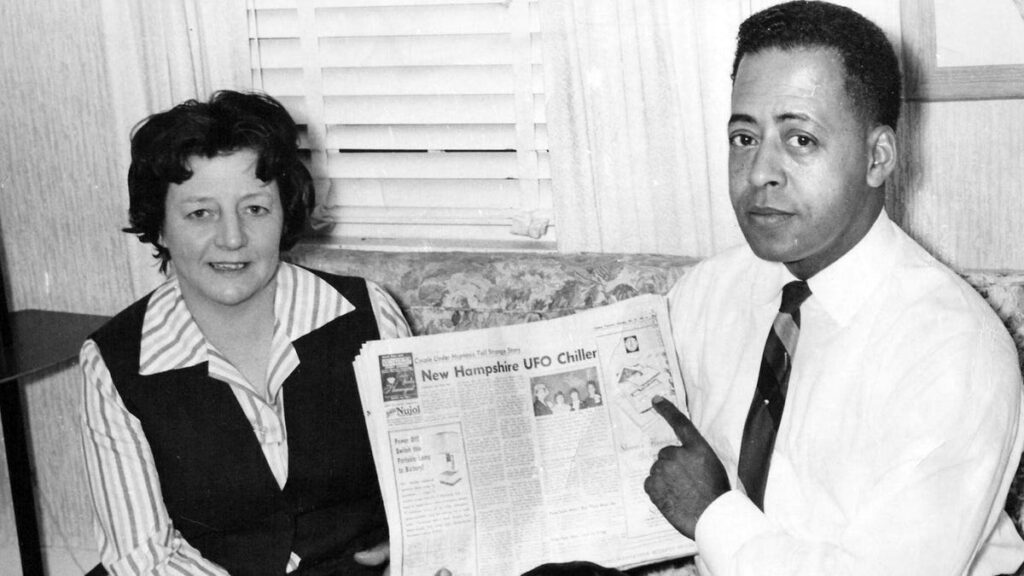No One Helped The First Credible Victims Of Alien Abduction

Nothing ends an optimistic faith in the goodness of government quite like an alien encounter. Our own Navy pilots have been terrified of losing their jobs for decades about coming forward about strange things in the sky, so why would anyone believe an average couple from New Hampshire?
The 2024 Lotus Emeya Is A 905-HP Beast
Of course, Betty and Barney Hill were anything but average. A new book, The Abduction of Betty and Barney Hill: Alien Encounters, Civil Rights, and the New Age in America by Matthew Bowman, dives into the people they were and they America they lived in when they experienced what’s considered the first credible alien abduction.
Slate has a great review about the book, which doesn’t really directly address the Hill’s claims, which they remained adamant about until their deaths. Rather, it asks, if the Hill’s story of bright lights, missing time and little gray aliens is not true, what does it say about the stresses and experiences the Hills were living under for them to so fervently believe that it was true?
If the Hills’ story is true, then nothing about the two of them really matters—all that matters is that aliens are real. But if the story is not true, then the specifics of their lives—their respective backgrounds, their marriage as an interracial couple in the 1960s, their lives in a state that nominally embraced liberal values while remaining overwhelmingly white and suffused with racist attitudes—are integral to understanding how they came to believe what they did. What led them to describe that night the way they did? Were they cranks? Was the experience a hysterical manifestation of stress? Were they being manipulated by unscrupulous actors eager to use the Hills to further their own beliefs?
[…]
Rather than a story of alien abduction, Bowman is more interested in telling the story of how, “in an environment of growing cynicism about the state and the science that the state sponsored, an inexplicable encounter propelled Betty and Barney Hill toward suspicion of traditional sources of authority and a consequent exploration of more esoteric possibilities.” (Bowman gives no real credence to the possibility an abduction could have occurred, but neither is he particularly invested in debunking UFO belief—he accepts the unlikeliness of the story as a given, and moves quickly to attempting to understand what led to it and what resulted from it.) The Hills moved through various disciplines of authority—the military, the church, psychiatric professionals—always with the goal of finding an established, credible person who would not only take them seriously, but also give shape and meaning to what they had experienced. Their failure to find validation in these traditional institutions offers, in microcosm, a story of the failure of a specific narrative of American progress and success.
For Bowman, understanding the Hills begins with understanding them as a product of New Deal liberalism. Betty was raised by liberals in a nearly all-white New Hampshire; her mother was a union organizer, and after her first marriage ended, she went back to school to become a social worker. Barney grew up in a prosperous Black neighborhood in Philadelphia, and from an early age was steeped in the respectability politics of the era. By the time they met, both were firm believers in the idea that the country was on a forward trajectory, and that through work, reason, and sensible policy, a healthier, happy America was possible.
The Hill’s story became iconic for what American’s think of as alien abduction scenarios. The two were traveling down a lonesome highway on a road trip in Quebec, when they noticed a bright light in the sky. They later found themselves at home at 5 a.m., when the trip should have only taken them until 2 a.m. at the latest. Both experienced nightmares after the events and Betty eventually convinced Barney to seek the help of a psychologist to help recover their memories. It’s from this retelling that we get the popular image of tiny gray aliens with large eyes and large heads forcing medical experiments on human beings of a reproductive nature.
After being dismissed by both their government and the medical establishment, Betty began to drift into the only community that supported them—the fringe UFO community. The breakdown of the book is as fascinating as the even itself, and you can read more about it here.



